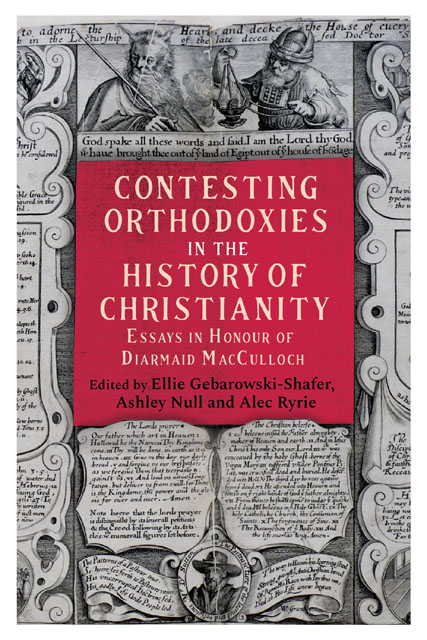Book contents
- Frontmatter
- Contents
- List of Illustrations
- List of Contributors
- List of Abbreviations
- Introduction
- 1 ‘Jewish Christianity’ in Antiquity: Meaningless Category or Heuristic Irritant?
- 2 ‘Sola Fide’: the Wrong Slogan?
- 3 Both Cromwellian and Augustinian: the Influence of Thomas Cromwell on Reform within the Early Modern English Austin Friars
- 4 Lex, Rex and Sex: The Bigamy of Philipp of Hesse and the Lutheran Recourse to Natural Law
- 5 The Authority of Scripture in Reformation Anglicanism: Then and Now
- 6 Orthodoxy and Heresy in the Post-Reformation
- 7 Profanity and Piety in the Church Porch: the Place of Transgression in Early Modern England
- 8 Writing on the Walls: Word and Image in the Post-Reformation English Church
- 9 The Myth of the Church of England
- 10 Mysticism, Orthodoxy and Reformed Identity before the English Revolution: the Case of John Everard
- 11 Sacrilege and the Sacred in England’s Second Reformation, 1640–1660
- 12 ‘I had not the patience to be quiet’: Arthur Bury and The Naked Gospel
- 13 ‘A soul-corrupting indifferentism’: the Intellectual Development of Benjamin Henry Latrobe
- 14 Newman, Dogma and Freedom in the Church
- 15 ‘Tommy, ’ow’s yer soul?’ Reconsidering Religion and the British Soldier
- 16 The King James Vulgate
- 17 The Myth of the Anglican Communion?
- Select bibliography of Diarmaid MacCulloch’s scholarly publications
- Bibliography
- Index
- Tabula Gratulatoria
- Studies in Modern British Religious History
15 - ‘Tommy, ’ow’s yer soul?’ Reconsidering Religion and the British Soldier
Published online by Cambridge University Press: 09 January 2024
- Frontmatter
- Contents
- List of Illustrations
- List of Contributors
- List of Abbreviations
- Introduction
- 1 ‘Jewish Christianity’ in Antiquity: Meaningless Category or Heuristic Irritant?
- 2 ‘Sola Fide’: the Wrong Slogan?
- 3 Both Cromwellian and Augustinian: the Influence of Thomas Cromwell on Reform within the Early Modern English Austin Friars
- 4 Lex, Rex and Sex: The Bigamy of Philipp of Hesse and the Lutheran Recourse to Natural Law
- 5 The Authority of Scripture in Reformation Anglicanism: Then and Now
- 6 Orthodoxy and Heresy in the Post-Reformation
- 7 Profanity and Piety in the Church Porch: the Place of Transgression in Early Modern England
- 8 Writing on the Walls: Word and Image in the Post-Reformation English Church
- 9 The Myth of the Church of England
- 10 Mysticism, Orthodoxy and Reformed Identity before the English Revolution: the Case of John Everard
- 11 Sacrilege and the Sacred in England’s Second Reformation, 1640–1660
- 12 ‘I had not the patience to be quiet’: Arthur Bury and The Naked Gospel
- 13 ‘A soul-corrupting indifferentism’: the Intellectual Development of Benjamin Henry Latrobe
- 14 Newman, Dogma and Freedom in the Church
- 15 ‘Tommy, ’ow’s yer soul?’ Reconsidering Religion and the British Soldier
- 16 The King James Vulgate
- 17 The Myth of the Anglican Communion?
- Select bibliography of Diarmaid MacCulloch’s scholarly publications
- Bibliography
- Index
- Tabula Gratulatoria
- Studies in Modern British Religious History
Summary
Few institutions can incubate more instinctive orthodoxies than armies, those giant mobile universities in which questions of life and death are never very far away. The breaking and remaking of orthodoxy happens most readily under the pressure of a crisis, and armies are in the crisis business. This essay considers the religious life of soldiers in the British army from the eighteenth to the twenty-first centuries. The conventional view of contemporary observers and of most historians was that the ‘scum of the earth’ were a godless lot. The truth, this essay argues, is more interesting. Armies are transient, intensely concentrated communities whose age structures, gender profiles and lived experiences are radically different from the civilian world’s. It should be no surprise that those distinctive circumstances fostered a distinctive religious culture, at least as intense as that of civilians, but with distinct emphases. The long Protestant aversion to prayer for the dead crumbled under the pressure of the First World War. There was a wider flourishing of practices and mindsets which the church establishment called superstition and fatalism, but that establishment’s inability to control soldiers’ religious experience should not lead us to accept its dismissals uncritically. British soldiers’ religion may not have adhered to the civilian world’s norms, but their distinct history should in fact lead us to question quite how normative the civilian experience was.
This essay challenges tenacious ‘orthodoxies’ held by historians, moralists and religious pundits alike – namely that, ever since the British army came into being around the turn of the eighteenth century, the British soldier, and especially the ordinary or ‘common’ soldier, has had scant use for organised or even orthodox religion. What religion he possessed (and it was, overwhelmingly, a case of ‘he’) was suffered as an imposition (in the form of the unsolicited attention of chaplains, forced attendance at public worship or the notorious rigmarole of the much-resented ‘church parade’); or was nurtured through the ministry of zealous evangelical ladies (operating from their evangelising and civilising soldiers’ homes); or was so promiscuously eclectic as to be wildly at odds with orthodox standards of belief (as manifested in colourful discourses and practices centred on fatalism and luck).
- Type
- Chapter
- Information
- Contesting Orthodoxies in the History of ChristianityEssays in Honour of Diarmaid MacCulloch, pp. 256 - 280Publisher: Boydell & BrewerPrint publication year: 2021

